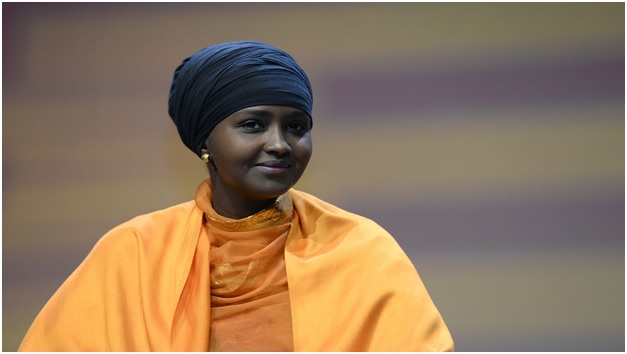A woman’s determination to confront patriarchy in Somalia

Fadumo Dayib became Somalia’s first woman candidate for the presidency in the recently concluded election. Of course she did not win in the deeply patriarchal society. But her decision is courageous and inspirational. Lots of work needs to be done to disrupt firmly rooted beliefs and practices against women in Somalia.
Fadumo Dayib’s announcement she would run for the presidency of Somalia sent shock waves through the Somalia’s political landscape which is male-dominated and the staunchly patriarchal Somali societies in general. Dayib, who is 44 and a mother of four, was born in Kenya to Somali parents and since 1990 had lived in Finland. Her announcement to run for the presidency marks and calls for a new era in the stabilization efforts in the war torn African nation. An era that emancipates progressive inclusivity and gender rights. Her announcement to run for the top office in the land defies and challenges misogyny and male privilege that is apparent in the androcentric Somali societies.
The monumental election of Ilhan Omar in Minnesota as the first Somali-American legislature shatters any conventional belittling and contempt for women that is rampant in Somali society. Somali culture marginalizes women and girls to the periphery. Their participation in politics and societal decision-making activities is restricted and nominal. Women suffer in relative silence due to strict boundaries in social status and participations. Fadumo Dayib, Ilhan Omar and many others are smashing these walls and bankrupting any beliefs and claims that women cannot enter and thrive in ‘high’ politics.
“A lot of Somalis are in shock because I appeared out of nowhere but managed to challenge all those in power”, Fadumo Dayip said in a telephone interview with the Guardian newspaper. Her campaign had already initiated and catalyzed broader reflections on women issues in Somalia.
With the announcement of her candidacy Fadumo Dayip had faced death threats and conservative pundits attacked her with insolence and rudeness. Numerous news websites ensnared their readers with false claims and news about the presidential candidate. All these news about her are frankly ridiculous and if not wildly inaccurate. For instance one misogynistic shrill website claimed that she abused and disrespected the Somali council of imams and sheikhs, the conservative religious body in the country.
Fadumo Dayip, an expert in public health and award winning activist, stood no chance of winning the presidency. A national assembly composed of 275 deputies was elected by 14,000 delegates from different regional states and clans. This national assembly then elected the nation’s president. The elections were marred by massive corruption and fraud. There were 18 candidates and Fadumo Dayip the only woman and the first ever to contest for the presidency. Despite pressure from the international community to have at least 30 per cent of the national assembly composed of women, elders and religious leaders opposed and limited the number of women in the national assembly.
The current government of President Hassan Sheikh Mohamud was stagnated by corruption and tribal political tag wars. The abysmal failure of the government to carry out any tangible steps on women’s rights issues, children and the elderly has serious consequences on the already large gender-gap in governmental institutions and the well-being of women in general. Rape and violence against women are common and unaccountable throughout the nation. These incidents go unreported by women due to the pressure to protect family and tribal honor. The few who report may even face further violence and societal stigmatization. Institutions like the police and judicial systems which could have protected women and children are not in place. The government had overlooked their plight, with no laws and institutions protecting them; Somali women live in a state of social misery.
The self-righteous and high-handed local religious leaders and elders are indifferent and vehemently deny women rights and their participation in politics. Contempt for women’s participation in politics and in important societal activities runs deep in the nation and all its social and political institutions.
Women particularly in Somalia and the East African region in general face many challenges. Structural discrimination hinders their participation in politics. Governments need to heed women’s voices and contribute to their empowerment. Politicians, intellectuals and religious leaders should contribute and work for thriving inclusive societies and be architects of change in the region.
There are progressive policies and laws passed by the governments concerning women’s rights all over the region, but implementation is often slow and inadequate. Coherent and sustainable policies with long-term a vision are needed to fully emancipate women rights. Post-1994 Rwanda is a good example for all African nations.
Fadumo Dayip risked her life and everything for change in Somalia. With numerous death threats her constant determination and resilience is admirable. The Kenyan newspaper Daily Nation writes about her that ‘she has stirred the political scene in her motherland and attracted death threats – including from Al-Shabaab terrorists – for her determination to become the first female president in the war-ravaged country’.
Hurrah! Fadumo Dayib.
* Abdirashid Diriye Kalmoy studies Political Science and Public Administration at Hacettepe University, Ankara, Turkey. [email protected]; [email protected]
* THE VIEWS OF THE ABOVE ARTICLE ARE THOSE OF THE AUTHOR AND DO NOT NECESSARILY REFLECT THE VIEWS OF THE PAMBAZUKA NEWS EDITORIAL TEAM
* BROUGHT TO YOU BY PAMBAZUKA NEWS
* Please do not take Pambazuka for granted! Become a Friend of Pambazuka and make a donation NOW to help keep Pambazuka FREE and INDEPENDENT!
* Please send comments to [email=[email protected]]editor[at]pambazuka[dot]org[/email] or comment online at Pambazuka News.
